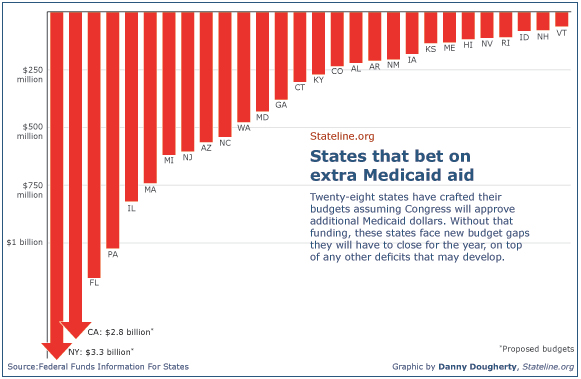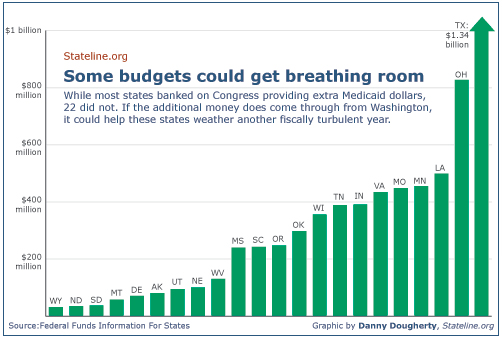The message was clear: states can’t wait any longer to receive funds from a proposed six-month extension of Federal Medical Assistance Percentages (FMAP), the rates used to determine matching funds for certain medical and social-service programs. The states, which have already made severe budget cuts, say they could be forced to slash funding even further and face the possibility of a double-dip recession.
Ten governors came together in Washington and by videoconference on the eve of when most states will adopt their FY 2011 budget. The bipartisan group begged Congress to pass a temporary emergency provision that stalled in the Senate last week after Republican opposition to the cost of the bill.
“This is crucial for the citizens of our state and crucial for the continued economic recovery,” said Pennsylvania Governor Ed Rendell, a Democrat, who spearheaded the event. Pennsylvania, which faces a $4.1 billion budget gap for 2011, has assumed $850 million in funding for programs covered by the provision. Rendell said he has already made $3 billion in cuts to the state budget.

Pennsylvania is not alone. Some 30 states depend on FMAP funds, which already have been included in their FY 2011 budgets. States face a cumulative budget gap likely to reach $140 billion in the coming year, according to the Center on Budget Policy and Priorities.
Each Governor made a two to three minute speech about the bleak environment and what would happen should they not receive the additional funding. Kansas Governor Mark Parkinson said his state might have to lay off 3,600 teachers. New York had expected nearly $1.1 billion in funding and Governor David Paterson said he is currently in the process of vetoing 6,900 programs. California and Texas were slated to receive the most funding from the FMAP extension.
“I will veto anything that adds to this state’s spending and drives the budget out of balance,” said Paterson. “I’m not doing that because I want to. It’s painful.”
Paterson didn’t offer specifics but he pledged New York wouldn’t borrow to meet the gap. “We have used up our rainy day funds,” he said, adding that without funding state workers would be laid off and he might impose a one percent cut on services across the board.

The Governors were unanimous in their concern about adding to the $1.4 trillion federal deficit, but argued not providing the extension would further slow the economic recovery and create thousands of potential job losses. “This is not the time to suddenly discover fiscal constraint while we are in the depths of a great recession and just beginning to come out of it,” said Kansas Governor Mark Parkinson.
“We have been making cuts, cuts, cuts and more cuts,” Parkinson said. “This is not so much about the state budgets as it is about the people we serve.”
Funds for FMAP were provided in the $787 billion economic stimulus package, which expires at the end of this year. The proposed extension would go through the end of June 2011, covering the second half of FY 2011 for most states.
Not authorizing the extension “would weaken the recovery and at worse it would push the economy into another recession,” said Nick Johnson, Director of the state fiscal project at the Center on Budget Policy and Priorities. It could cost the economy 900,000 private and public sector jobs, he said. Although budget cuts will still occur at the state and local levels, FMAP funding would close a small portion of the budget gaps, Johnson said.

